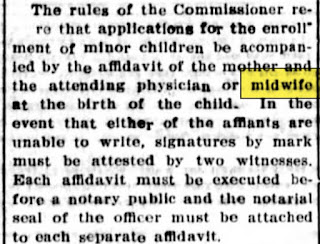Our goal is to identify documents and record groups that often provide a mother’s maiden name or family name.
1. Obituaries. Obituaries should be scour.
2. Church Records. Marriage records often name parents, and family members as witnesses. Local preachers may have kept records. You may uncover your female ancestor through her family connections.
Birth certificates, delayed birth certificates, and death certificates may name mother’s maiden name. These may also assist with #1: separating family units.
4. Social Security Application ($$). This may not be fruitful as the children may not have known their mother’s maiden name. But, be sure to re-evaluate the cost/risk-benefit.
5. Marriage Records. Marriage applications often name the mother’s maiden name. Review the marriage records for all children.
6. Midwife Records / Family Bibles.
 |
| Muskogee Times-Democrat, 28 Apr 1906, Pg2 |
Midwives typically know the community families and may have recorded a maiden name. Don’t forget to research the area midwife(s). And remember, the family's midwife may have been a relative.
7. Newspapers (Local and Online). Obituaries and even the court recorder's published announcements may proffer names and relationships.
8. Land Records. Did they own land. How did they acquire it? Land deeds may provide hints to the female's family, parents, or names of a first husband, if applicable.
Don’t forget the rejected Native American applications.
10. Local Records. School census and enrollment documents will provide birthdates and parentage hints, and possible extended families. Review school records for all children.
Kathleen Brandt
Be Historically Correct
Be Historically Correct
a3genealogy.com
Accurate Accessible Answers
a3genealogy@gmail.com
Accurate Accessible Answers
a3genealogy@gmail.com





No comments:
Post a Comment